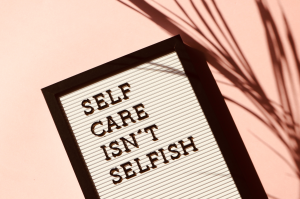Year of YOU- Nutritional Self-Care
Earlier this month, we officially kicked off the Spring season with the launch of our April series, Year of You, starting with the importance of Prioritizing Yourself and embracing your individuality when it comes to nutrition. This week, we’re diving into another important step of the journey…Self Care.
We’re all familiar with this buzz word because we’ve been hearing about it on social media and in magazines for years. But what exactly is the relationship between self-care, food and our nutrition goals? Well, if you think about it, so much about our day-to-day lives can be tied back to our bodies: how they’re feeling, how they’re functioning, what they’re capable of. In other words, when we FEEL our best, we're able to do more of the things we enjoy. And that’s where nutritional self-care comes in.

The first step in establishing a new eating behavior is addressing self-talk, that little voice inside each of us that often plays like a radio station in our heads. Here’s the thing: it’s up to YOU to decide which station you’re listening to. Replacing negative, doubtful thoughts with positive, encouraging ones is a huge step forward when it comes to establishing new habits. Studies have found that we can even take this a step further by practicing distanced self-talk. Instead of referring to yourself in the first person and using ‘I,’ try using your own name instead, as if you were talking to a friend. This simple adjustment to your inner dialogue has been proven to be a valuable self-control strategy that encourages healthier eating.

Step two is all about setting goals. But not just any goals, SMART ones:
- Specific
- Measurable
- Achievable
- Realistic
- Timely
Think back to some of the health goals you’ve set over the years. Think about the ones you achieved and the ones that proved to be more difficult. Research finds that the greatest success is often found when goals can be linked to each other. For example, most dieters struggle with long-term weight loss, especially if they are only focused on becoming smaller. But those who integrate their weight loss efforts with other life goals (e.g. having more energy to play with my children, saving money by not eating at restaurants as often, etc.), have significantly higher success rates of both goals. Taking the time to set SMART goals and to incorporate them into your everyday lifestyle is such a valuable key to self-care.

We know how overwhelming it can be to set out on a new nutrition journey, especially when the target seems so far away. But all you have to do is focus on taking the first step, not looking at the whole staircase. Here are some of our favorite tips for getting started:
- Spend at least 2hrs/week consciously making intentional food choices. Grocery shopping, dining out, deciding what to eat in the moment…these are all opportunities to practice intentionality!
- Eat when you’re hungry and stop when you’re full. Initially, this may be easier said than done, but with NTNA’s systematic approach, you will get reacquainted with your body’s hunger and satiety cues.
- Focus on building a sense of power over tempting, “trigger” foods that are often eaten in excess during times of stress, anxiety, happiness, loneliness, etc. (No more emotional eating!)
- Enlist the help of family and friends for accountability on achieving your goals. Asking a spouse not to bring home take-out, enlisting a friend to echo your own desires to drink water instead of soda during your lunch break together... Evidence suggests that involving a partner- or trusted friend- in behavior changes can drastically help improve healthy outcomes. And who knows, maybe your new habits will inspire those around you to make changes of their own!

The key to prioritizing yourself when it comes to nutritional self-care is all about laying a solid foundation and making small changes that ultimately add up to big long-term goals. Most people know that they ‘should,’ but they get stuck on the ‘how.’ And that’s where NTNA comes in. We’re here to show you how.

 RSS Feed
RSS Feed